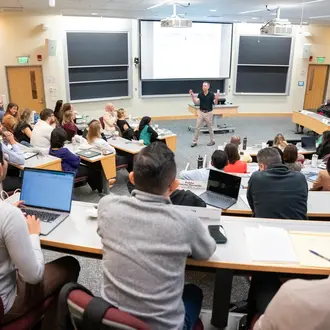Bridget Akinc EMBA '13
“To develop principled, innovative leaders who improve the world and to generate ideas that advance management practice.”
With the MIT Sloan mission in mind, the “Leading with Impact” course was established four years ago by Professor Nelson Repenning, Johanna Hising DiFabio, and Diana Ganz, EMBA ’14, to provide EMBA students with the challenge of applying business principles to make an impact in the nonprofit sector. In the final week of the twenty-month Executive MBA Program at MIT Sloan, the executives who have been students of business and management as a part of the EMBA class take on a business challenge faced by a local nonprofit organization. The goal is simple – making an impact. But, the complexity of the projects becomes evident from Day 1.
Day 1 is a day of service designed to enable students to “go, see and assess” the organization on site through exposure to the breadth of services they provide. But Day 1 also allows students to build trust and empathy with their nonprofit leaders and client community – nonprofit leaders work hard to design a day of service that brings EMBA students face to face with members of the community they serve, often some of our society’s most vulnerable neighbors. Students serve alongside homeless teens and adults, formerly incarcerated individuals, enterprising youth exiting the foster care system, survivors of domestic violence, children with complex medical needs, recent refugees, and parents struggling to make ends meet. For many, this humbling experience is a window into the “real world” in Boston that is both eye-opening and gut-wrenching.
On one level, it may seem too simple a task – to ask a team of executives who lead organizations in complex, multinational companies and fast-growing entrepreneurial businesses to take on a business challenge from a local, leanly-staffed nonprofit organization. On the other hand, the social causes these nonprofits aim to solve are called “intractable problems” in many circles because of their complexity. The MIT teams aim to deliver near term and long term steps that can be taken to improve the outcomes of their nonprofit organization in solving a challenge critical to the mission of the organization.
The nonprofit leaders develop their problem statement for the EMBA team months before the Leading With Impact week in a workshop with Nelson Repenning on work design. Nonprofit leaders immerse in refining a problem statement, collecting data and designing service day that will immerse their talented team of EMBA’s in the work of their organization in order to solve the challenge they face. Even after twenty grueling months of balancing a demanding curriculum and full-time leadership position at their organizations, the EMBA’s in their final week at MIT pour an unbridled amount of energy and analysis into the business and operational challenges of their nonprofit, knowing that they have the potential to make a huge positive impact in an organization working to effect real change in Greater Boston community.
Leading With Impact is a week that asks students from all different sectors to apply the skills and frameworks they have gained from their Sloan experience into work as a team in solving an operational or business challenge critical to the mission of the local nonprofit organization. MIT EMBA teams wrestle not only with the best recommendations through the frameworks they have learned at Sloan, but how the solutions they are recommending would best be implemented in an organization that is leanly staffed and often budget-constrained. Jarred Damico of the Middlesex Human Service Agency noted that recommendations they received were “succinct, actionable, and impactful,” and noted that they are already using them in setting up their new warehouse. Erin Dyson-Enamorado of the youth-powered social enterprise MoreThanWords shared “Their findings and recommendations offered more information and hard numbers on why we need to make staff investment” in a given area. Rene Milet of Bikes Not Bombs reflected, “It was moving, honestly, to see problems we have been grappling with on a daily basis reframed afresh, and solutions presented that address both bottom-line as well as morale concerns.”
Throughout the week, MIT faculty including Scott Stern, Chuck Kane, Roberto Fernandez and Erin Kelly, and guest speakers including Gerald Chertavian of YearUp, Marie St. Fleur from the MA State Assembly, Robert Lewis Jr. from The Base encouraged the EMBA students to explore what roles they could play as leaders of organizations and board members in solving challenges in their home communities. The week delves into topics of bias, race, and poverty, as EMBA students contemplate the role of companies, of government, of philanthropy, and of nonprofits in addressing complex social issues. As business people, we understand inherently that you cannot have a healthy economy without healthy communities. And, in a remarkable paradigm shift over the last two decades, we have seen a tremendous shift in the role that we expect the private sector to play in solving complex social challenges. We have seen a rising expectation for businesses to engage meaningfully in their communities, not simply through philanthropy, but in addressing complex social challenges in education, health, the environment and the social infrastructure that will fuel the growth in our economy. In many ways, this Leading With Impact week is about the first part of the mission – “to develop principled, innovative leaders who improve the world” … but what the students and faculty uncover in their discussions with leaders in the social and private sector over the course of the week can best be described by the second part of the mission: “to generate ideas that advance management practice” in considering the role of the corporation and business leaders in society. It is remarkable to witness the depth of inquiry and reflection the EMBA students bring back from their experience in Leading With Impact as they consider the roles they will play in their communities as business leaders as they become graduates of MIT Sloan.
Bridget Akinc, EMBA ’13, is CEO of Building Impact, a nonprofit organization in Boston.



